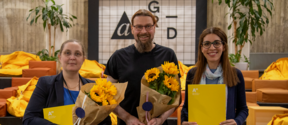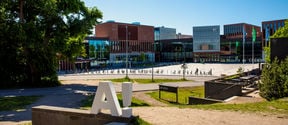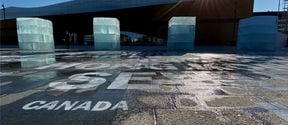Movie research results: Multitasking overloads the brain
The impact of a short segment of Indiana Jones movie on the diverse areas of the brain. Image: Juha Lahnakoski
Previous research shows that multitasking, which means performing several tasks at the same time, reduces productivity by as much as 40%. Now a group of researchers specialising in brain imaging has found that changing tasks too frequently interferes with brain activity. This may explain why the end result is worse than when a person focuses on one task at a time.
‘We used functional magnetic resonance imaging to measure different brain areas of our research subjects while they watched short segments of the Star Wars, Indiana Jones and James Bond movies,’ explains Aalto University Associate Professor Iiro Jääskeläinen.
Cutting the films into segments of approximately 50 seconds fragmented their continuity. In the study, the subjects’ brain areas functioned more smoothly when they watched the films in segments of 6.5 minutes. The posterior temporal and dorsomedial prefrontal cortices, the cerebellum and dorsal precuneus are the most important areas of the brain in terms of combining individual events into coherent event sequences. These areas of the brain make it possible to turn fragments into complete entities. According to the study, these brain regions work more efficiently when it can deal with one task at a time.
Inadequacy and overloading
Jääskeläinen recommends completing one task each day rather than working on a dozen of different tasks simultaneously.
‘It’s easy to fall into the trap of multitasking. In that case, it seems like there is little real progress and this leads to a feeling of inadequacy. Concentration decreases, which causes stress. Prolonged stress hinders thinking and memory,’ says Jääskeläinen.
The subjects’ brain areas functioned more smoothly when they watched the films in longer segments. Image: Juha Lahnakoski
The neuroscientist also sees social media as a challenge.
‘Social media is really nothing but multitasking, with several parallel plots and issues. You might end up reading the news or playing a game recommended by a friend. From the brain’s perspective, social media only increases the load.’
In addition to Jääskeläinen, Juha Lahnakoski from Max Planck Institute, Mikko Sams from Aalto University and Lauri Nummenmaa from the University of Turku participated in the research.
More information:
Iiro Jääskeläinen
Aalto University
tel. +358 50 560 9503
[email protected]
Article: Neural mechanisms for integrating consecutive and interleaved natural events (onlinelibrary.wiley.com)
Video (intended for research group page only): https://drive.google.com/file/d/0B5pFkSAzmKTTOTlwN0VJXzFHSU0/view
Read more news

Aalto Open Science Award ceremony brought together Aaltonians to discuss open science
Last week we gathered at A Grid to celebrate the awardees of the Aalto Open Science Award 2023 and discuss open science matters with the Aalto community.
Seed funding available to boost collaboration between Aalto, KU Leuven and University of Helsinki
Aalto University, KU Leuven and the University of Helsinki launch the 2nd exploratory seed funding call to explore research collaboration possibilities. The funding call is open until 10 September 2024.
Professor Peter Hans Matthews works as a Fulbright-Aalto Distinguished Chair scholarship holder at the Department of Economics
Fulbright programmes and scholarships are highly appreciated in the United States